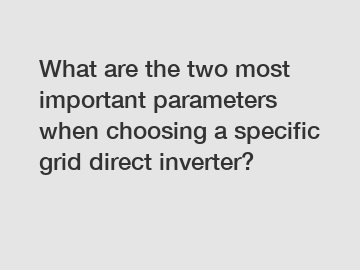Jan. 07, 2024
Energy
What are the two most important parameters when choosing a specific grid direct inverter?
Choosing the right grid direct inverter for your solar power system is crucial. The inverter is responsible for converting the direct current (DC) generated by solar panels into usable alternating current (AC) that can power your household or be fed into the grid. There are several factors to consider when selecting an inverter, but two parameters stand out as most crucial: efficiency and voltage compatibility.
Efficiency is a key parameter to consider when choosing a grid direct inverter. It refers to how well the inverter can convert the DC power from solar panels into AC power. Higher efficiency means less energy loss during the conversion process, resulting in more electricity being available for use. Inverters with higher efficiency ratings can maximize the overall performance of your solar power system and help you achieve greater energy savings.

Voltage compatibility is another vital parameter to evaluate. Grid direct inverters need to match the voltage requirements of your household or the electrical grid you plan to connect to. The two most common voltage options are single-phase and three-phase power systems. Single-phase inverters are suitable for residential applications, whereas three-phase inverters are generally used for commercial or industrial installations. It is crucial to choose an inverter that is compatible with the voltage system you have or plan to install.
Now, let's delve into the points to discuss why efficiency and voltage compatibility are the two most important parameters when choosing a grid direct inverter:
1. Efficiency:
a. Higher efficiency means more power generation: Inverters with higher efficiency ratings ensure that you can make the most out of your solar panels by converting a greater percentage of DC electricity into usable AC power. This results in improved energy generation and increased savings on your electricity bills.
b. Better performance in challenging conditions: Inverters with high efficiency are designed to perform well under various conditions, such as low light or partial shading. They can optimize power production even when some panels in your solar array are not operating at their full potential.
c. Longer lifespan: Efficient inverters generate less heat during operation, which reduces wear and tear on components and extends the overall lifespan of the inverter. Choosing an efficient inverter can save you from frequent replacements and maintenance costs.
2. Voltage Compatibility:
a. Seamless integration with existing systems: When installing a grid direct inverter, it is crucial to ensure that it is compatible with the voltage system already in place. This compatibility allows for a smooth integration of the solar power system, minimizing the need for additional modifications or rewiring.
b. Meeting safety requirements: Voltage compatibility ensures that the inverter operates within the specified voltage range, meeting the safety standards set by electrical regulatory bodies. This prevents any potential damage to appliances, electrical circuits, or the grid itself.
c. Scalability and future-proofing: Choosing an inverter compatible with your voltage system enables you to expand your solar power system in the future without the need to replace the inverter. This scalability allows for easier system upgrades and helps future-proof your investment.
In conclusion, when choosing a specific grid direct inverter, efficiency and voltage compatibility are the two most important parameters to consider. Focus on selecting an inverter that offers high efficiency to maximize power generation, increase savings, and ensure optimal performance. Additionally, prioritize voltage compatibility to seamlessly integrate your solar power system with the existing electrical infrastructure and meet safety standards. By considering these two crucial parameters, you can make an informed decision that aligns with your energy needs and future expansion plans.
If you are looking for more details, kindly visit single vs 3 phase inverter, solar power 3 phase inverter, commercial inverter systems.
If you are interested in sending in a Guest Blogger Submission,welcome to write for us!
All Comments ( 0 )